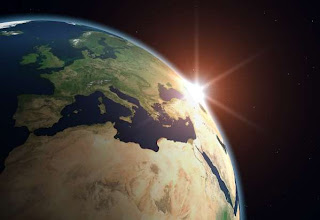
The American journalist Robert Koehler has written a searing and heartfelt essay on the ecological disaster in the Gulf of Mexico and its deeper political and corporate antecedents. As Koehler points out the villains are many, primarily BP and the other corporate and government institutions and leaders.
However, we in the developed world are all implicated. As Koehler points out, this is a crises of civilization, bought on by a corporate economic system built on exploitation of the planet, endless growth and dependence on oil. And we all are part of that system and we must all act now to reverse the destruction.
And let's not forget that the same corporate driven economic system is responsible for more serious ecological disasters away from the prying eyes of the Western media (Earlier pieces on this blog highlighted the environmental catastrophes unfolding in the Niger Delta and in China).
Extracts from Koehler's piece are below and the complete article can be read here.
First Do No Harm
by Robert Koehler, Huffington Post
As Planet Earth continues to hemorrhage crude oil from its wound -- with a worst-case estimate of as much as 100,000 barrels a day -- we grope, beyond our anger and guilt, simply to imagine what damage we have done in the pursuit of human empowerment.
This is bigger than BP, blameworthy though the company may be. This is bigger than any sort of "us vs. them" scenario we can think of. It's a crisis of civilization, which means all of us.
If we drive, use energy, buy products wrapped in absurd, throwaway plastic -- if we live at all -- it cuts across our lives. The roots of this disaster, and, God help us, the ones to come, are political and corporate and governmental, and they are also intensely personal. We all collude in society's "addiction" to oil, or what I would call its sense of entitlement: This is our planet. We're the boss.
What we're truly addicted to, or at least inextricably caught up in, is what my friend Jim Oberg calls "doomsday capitalism" and its need for reckless, unlimited economic growth. With this system operative, we trend toward war, empire and exploitation.
Maybe, as we look at the graphics of this disaster -- pelicans, for instance, covered in black goo -- we begin to grasp our immaturity as a species. Let's say we do survive ourselves and create a sustainable, eco-harmonious way to live and prosper: what we're presently churning up in our clumsiness and techno-entitlement is a warning to the future of how not to be. We're scaring up a whole new mythology, and new definitions of sacrilege.
I know nowhere to start except here. And I know of nothing less to reach for than... salvation.
I use this language not to promote existing religions, which far too often collude in the problem, but to reach deep into the human core, into the raw material of existence, to find new commonality with one another and to discover new -- or perhaps I mean to rediscover ancient, uncompromised and uncorrupted -- principles to live by.
The rebuilding of human society cannot be superficial. It must begin with a realization that those in power mostly have no idea what they're doing; they operate with crippling short-sightedness, in a context of eerily limited self-interest.. .......
Knowledge that this is the case leads either to despair and cynicism or translates into a deeper, more profound sense of personal responsibility. I opt for the latter, understanding that present-day U.S. democracy is comfortable with a spectator citizenry: entertained, isolated and disengaged. We don't pursue the sort of awareness that would propel us into troubled discontent, and we're not supposed to. But it's our only choice. And while this sort of awareness doesn't translate into easy or obvious action, maybe that's OK.
First, do no harm.
What if that phrase, which is the byword of many professions, became a sort of operating principle with which to proceed, individually and collectively, into the future? Even if it's an impossible standard, wouldn't we be far better off attempting to live by its implications, or at least reflecting on them and debating them, than by mockingly dismissing them?
Our most destructive enterprises all depend on moral relativism and a suspension of this value, allegedly in service to a greater good, which generally fails to materialize. I submit that the "greater good" argument is a convenient scam, pulled out of a hat time and again by those intent on gaming the system for limited, self-serving ends.
Yet it springs eternal -- certainly as the ultimate argument for war, but also for anything that might generate a profit.
..........The crisis is upon us. Our paradoxes have come home to roost, and they're covered with oil.Robert Koehler is an award-winning, Chicago-based journalist and nationally syndicated writer at koehlercw@gmail.com or visit his Web site at commonwonders.com.)
© 2010 TRIBUNE MEDIA SERVICES, INC.
No comments:
Post a Comment